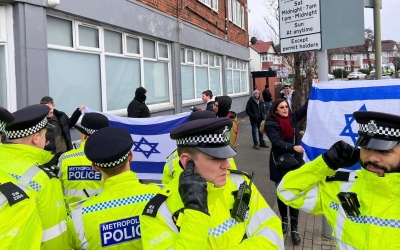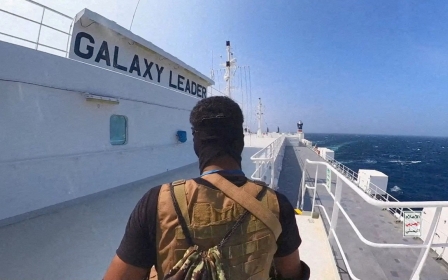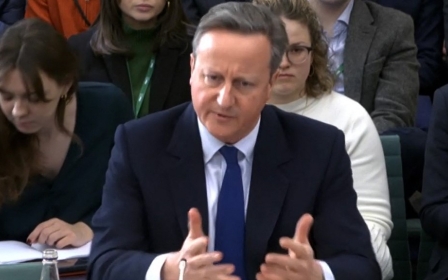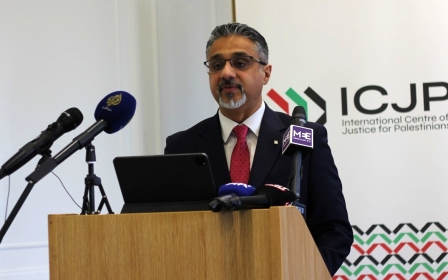War on Gaza: Questions raised about UK-Israeli air force chiefs' meeting
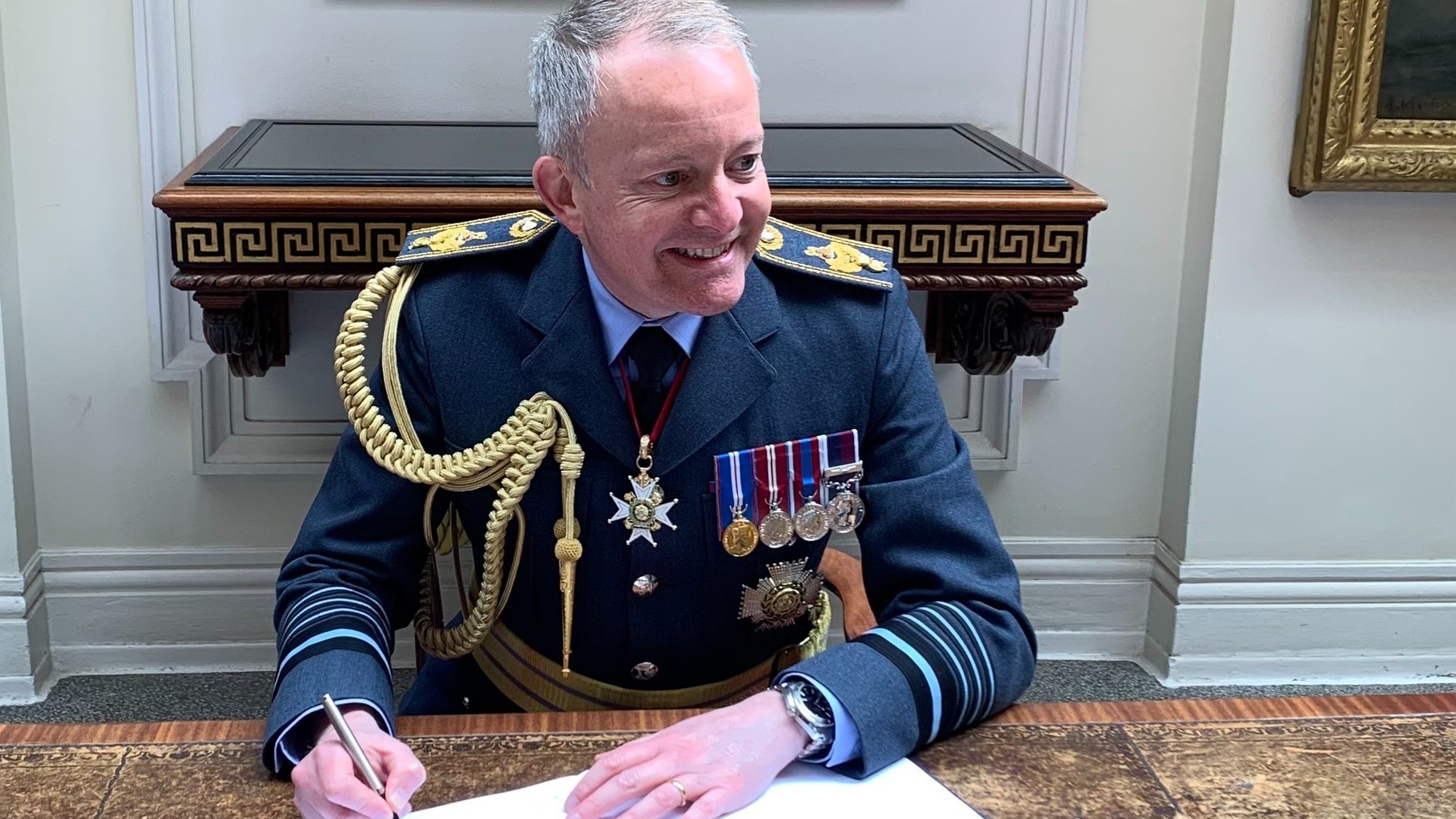
The head of the UK’s Royal Air Force (RAF) has met with his Israeli Air Force (IAF) counterpart - but the government in London has refused to disclose if British concerns about Israel’s war on Gaza were raised.
Air Chief Marshal Sir Rich Knighton visited Israel for a “long-planned air force-to-air force talks” with IAF chief Major General Tomer Bar last week, the Ministry of Defence (MoD) confirmed.
“Service chiefs regularly engage with other service chiefs around the world to improve understanding and international relationships,” a MoD spokesperson told Middle East Eye.
The meeting took place just before Israel's bombardment in Gaza reached 100 days last Sunday.
So far, at least 24,620 people have been killed and 61,830 injured, with an estimated 70 percent of the enclave’s civilian infrastructure destroyed.
New MEE newsletter: Jerusalem Dispatch
Sign up to get the latest insights and analysis on Israel-Palestine, alongside Turkey Unpacked and other MEE newsletters
Israeli Prime Minister Benjamin Netanyahu began the assault after fighters from Hamas attacked Israel on 7 October, killing an estimated 1,140 people.
MEE asked the ministry if the air force chiefs had discussed Israeli air strikes on civilians in Gaza and how the IAF could minimise these, and whether or not the British foreign policy objective of a “sustainable ceasefire” to allow greater volumes of aid into the enclave was raised.
The MoD said that the matters discussed between the two chiefs were “not known”. Even if they were known, the department said it would not be for public release, given that the talks were routine and long-planned.
Days before the meeting, UK Foreign Secretary David Cameron said he was “worried” that Israel may have breached international law, specifically through its bombing campaign in Gaza.
“Am I worried that Israel has taken action that might be in breach of international law because this particular premises has been bombed or whatever?” Cameron told the Foreign Affairs Committee on 9 January. “Yes, of course, I’m worried about that.”
Legal challenges and complaints
The British government's support for Israel’s campaign in Gaza has come under increasing scrutiny.
In December, legal and human rights groups filed a challenge against the UK government in the High Court, arguing that the UK has breached its legal obligations by continuing to license arms sales to Israel.
Follow our live blog for all the latest on the Israel-Palestine war
Reports from the news website Declassified have raised questions about the extent to which RAF Akrotiri, a British airbase in Cyprus, is being used by the UK and US in support of Israel's campaign.
Earlier this week, the International Centre of Justice for Palestinians (ICJP), a UK-based advocacy group, filed a criminal complaint with the Metropolitan Police against senior UK politicians, alleging their complicity in war crimes committed in Gaza through their support of Israel.
Tayab Ali, ICJP’s head and a lawyer with London law firm Bindmans, told MEE that it was understandable that countries would have bilateral relations and military cooperation in peacetime.
But, Ali said, if one party is alleged to have been involved in crimes as serious as genocide during a war, then it’s crucial “that it is made clear that any lawful continued military cooperation can only be done if the alleged perpetrating partner desists from acting in a way which could breach international law.
“The UK should be careful that, as a result of its continued cooperation with Israel, it doesn’t find itself complicit in war crimes and potentially facing charges in The Hague."
Questions on UK arms sales
Several arms control experts told MEE that given evidence that Israel is committing war crimes in Gaza, they would have expected the UK government to suspend arms exports.
But, said Emily Apple, media coordinator for the UK-based Campaign Against the Arms Trade, it is “cosying up to the Israeli air force responsible for an ongoing bombardment that has killed thousands of people and turned Gaza into what the UN has described as a 'graveyard for children'".
'At what point does the level of civilian harm become a determinant in reconsidering or canceling such engagements?'
- Iain Overton, Action on Armed Violence
The MoD’s refusal to disclose what the chiefs discussed, Apple said, “shows a complete lack of accountability by this government over its complicity in the genocide the Israeli government is perpetrating against Palestinian people in Gaza”.
Iain Overton, executive director of Action on Armed Violence, said data from his organisation’s Explosive Violence Monitor has shown that since 7 October, there had been an average of 10.1 Gaza civilian fatalities per injurious Israeli air strike.
That figure, he said, is significantly higher than the global average of recorded civilian harm caused by air strikes.
“It’s crucial to ask why the UK’s Royal Air Force would hold talks with a force that has been involved in such violence,” he said.
“If these discussions were part of a long-standing mission, at what point does the level of civilian harm become a determinant in reconsidering or cancelling such engagements?”
Anna Stravianakis, director of research and strategy at UK-based Shadow World Investigations, said the abundant evidence of indiscriminate bombing of Palestinian civilians and civilian infrastructure, as well as the deliberate targeted killing of Palestinian journalists, “should be focusing the minds of Israeli and British military and political leaders”.
Both states, Stravianakis said, have obligations under the Genocide Convention and wider international law, and the UK is obliged to stop supplying weapons under the terms of the Arms Trade Treaty.
“No doubt both states will seek routes to deny or obscure these responsibilities, but it is clear that much of the rest of the world is watching and acting in solidarity with Palestinians,” she said.
Middle East Eye delivers independent and unrivalled coverage and analysis of the Middle East, North Africa and beyond. To learn more about republishing this content and the associated fees, please fill out this form. More about MEE can be found here.


